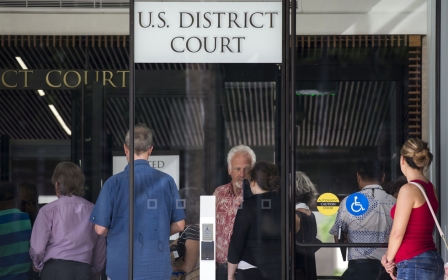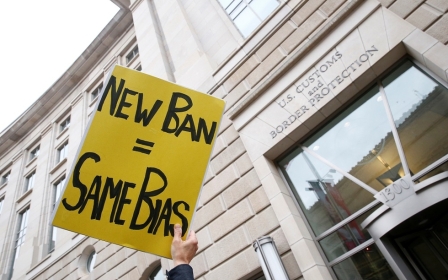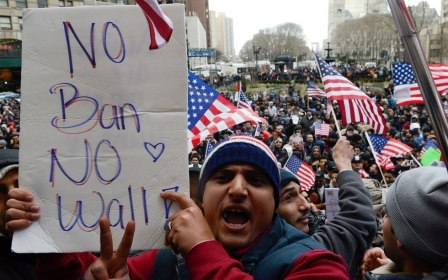Rights groups brace for long fight against Trump's travel ban
WASHINGTON, DC – After the Trump administration received a further blow to a travel ban on six predominately Muslim nations, residents in the nation’s capital expressed a sigh of relief.
“Even though [President Donald] Trump lives here, this isn’t his city,” Jerry Richards, a retired bus driver who lives in north DC, told Middle East Eye on his way to the store. “We aren’t about discrimination.”
While Richards appeared elated, those who opposed the travel ban were preparing for a long fight.
Yolanda Rondon, an immigration and civil rights lawyer with the American-Arab Anti-Discrimination Committee (ADC), the largest grassroots organisation of its kind, told MEE that the decisions from federal courts in Hawaii and Maryland placing a freeze on Trump's executive order are just the beginning.
“The courts will now look at arguments on merits to determine if the arguments against the ban look likely to succeed. If they do, a permanent freeze will be issued,” Rondon said.
She said there are a number of legal pathways moving forward, including a trip to the 9th and 4th Circuit Courts of Appeals in San Francisco and Virginia, respectively, where the Trump administration could challenge decisions from Hawaii and Maryland.
Even though Trump lives here, this isn’t his city
- Jerry Richards, retired bus driver
A matter of national security?
The newly blocked travel ban follows a previous one that was struck down in February. The Trump administration’s revised executive order would have stopped new visas from being issued to people from Somalia, Iran, Syria, Sudan, Libya and Yemen for 90 days and shut down the US refugee programme for 120 days. It would not have applied to those with green cards or visas. Iraq, a US partner in the fight against the Islamic State (IS) group, was removed from the list.
The administration argues that the temporary ban is necessary to allow time to create “extreme vetting” procedures for new refugees in the interest of national security.
Shortly after the Hawaii court blocked the order, Trump told supporters at a Wednesday night rally in Tennessee that "the danger is clear. The law is clear. The need for my executive order is clear … This ruling makes us look weak." The president went on to suggest that he would take the case to the Supreme Court.
The White House vowed to "vigorously defend" the ban on Thursday, promising it would battle its suspension in federal courts.
"We intend to appeal the flawed rulings," a White House spokesman said.
Irina Manta, professor of Law at the Maurice A Deane School of Law at Hofstra University and president of the 11/9 Coalition, a grassroots organisation that works for the protection of civil liberties, said the Trump administration could argue before appeals courts that there “is no violation of the Establishment Clause, and the case could eventually end up before the US Supreme Court. I would not be surprised if the administration pursued this strategy.”
The Establishment Clause is found in the First Amendment of the US Constitution and serves to keep the government out of religious affairs. Critics of the travel ban have argued that the government is deciding who is and is not Muslim, which would be a violation of the clause.
A steep reduction
Trump’s revised travel ban would also dramatically cut refugee admissions from 110,000 to 50,000. While the entire order was stayed, meaning the reduction does not immediately go into place, Manta said the administration “largely has discretion over the total number of refugees allowed”.
Legal groups could argue that the reduction inherently violates the Establishment Clause, but it would be difficult because “the link between total number and discrimination is harder to discern even if it is present,” Manta said.
Jaylani Hussein, the executive director of the Minnesota office of the Council on American-Islamic Relations, told MEE that a refugee admissions cut would have a huge effect on the Muslim community in his state.
“Minnesota has a large Somali population, and many are waiting for their family members to be resettled here in the US. If the number were cut in half, what would happen to them?” Hussein asked. “They don’t know what’s coming next. This situation is very stressful for both asylum seekers and for people who have already gone through the process of attaining residency,” he said.
The steep reduction in refugees would place people in great harm, according to Betsy Fisher, policy director of the International Refugee Assistance Project. The cut would mean, “at minimum there are 60,000 people that are pretty far along in the asylum process, which takes about two years to complete, and those people are left in indefinite limbo”.
“Some of those people are in direct threat. Many worked for the US in Iraq,” Fisher told MEE.
Moving forward, Fisher said that advocates for refugees must continue fighting. Although the stays on the ban are a relief, “there’s no final decision on any of these matters,” she added.
Intent and impact
Rondon, the DCA lawyer, agreed. However, she said that the case may end before the high court for a number of reasons. The Trump administration’s argument that it is a matter of national security is one, “but they haven’t provided any data to support this,” Rondon said.
Courts look not only at the wording of the executive order, but also at intent and impact. Because of the Trump administration’s many calls for a Muslim ban, Rondon said she does not believe any such order will survive the test of the courts.
However, Rondon said the growing concerns about the government’s intentions and overuse of national security as a justification might carry the case to the Supreme Court. “I think the courts are ready to challenge that deference to national security.”
This comes from revelations from whistleblowers such as Edward Snowden, who revealed the extensive global surveillance undertaken by US intelligence services in 2013, as well as the public outcry towards the Trump administration’s travel ban, which “is mostly affecting students, families, the elderly and poor.
“We can’t take the government at its word. I think the courts are finally ready to check the abuse of power,” Rondon said.
New MEE newsletter: Jerusalem Dispatch
Sign up to get the latest insights and analysis on Israel-Palestine, alongside Turkey Unpacked and other MEE newsletters
Middle East Eye delivers independent and unrivalled coverage and analysis of the Middle East, North Africa and beyond. To learn more about republishing this content and the associated fees, please fill out this form. More about MEE can be found here.




